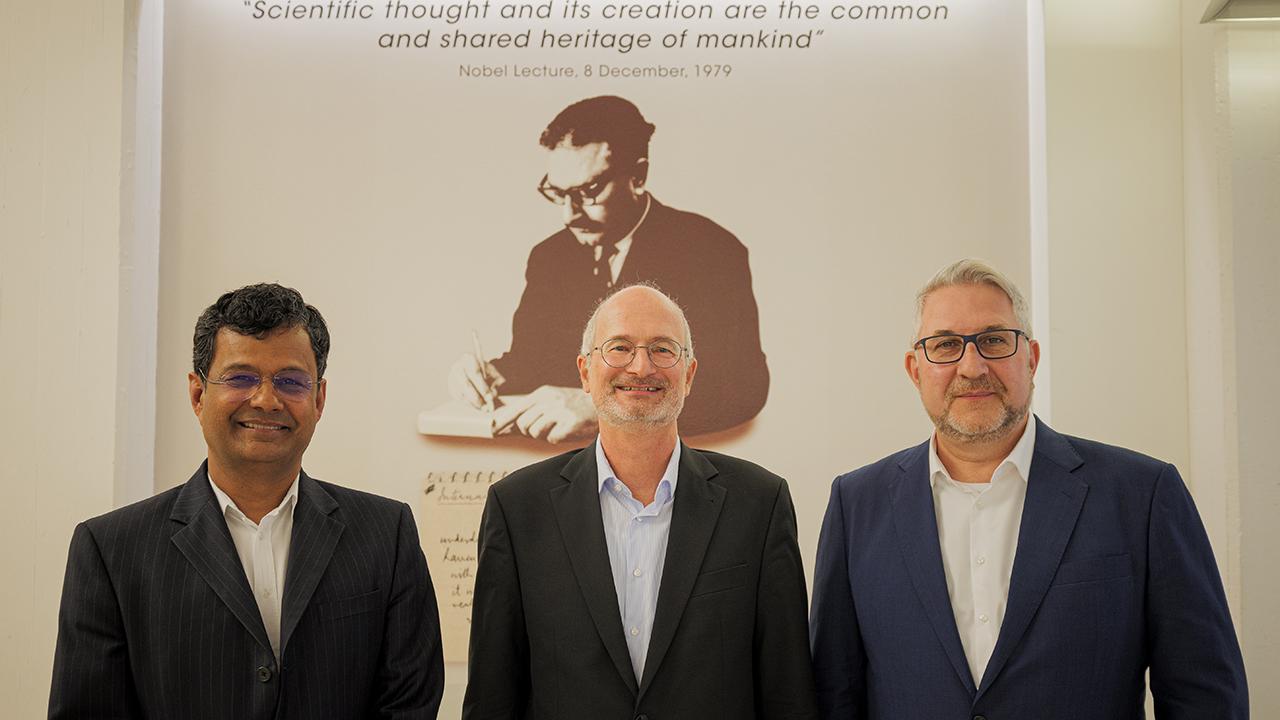
ICTP has recently partnered with the Wilhelm and Else Heraeus Foundation, a private institution that supports scientific research and education with an emphasis on physics, to organize two workshops at ICTP in 2024. The first one took place in April and was titled “Frontiers of the intersection of quantum simulations and machine learning”; the second one will start in just a few days and will be dedicated to “Sustainability and resilience through large scale infrastructure”.
Back in April, Stefan Jorda, managing director of the Heraeus Foundation, visited ICTP during the quantum simulations and machine learning workshop, and he kindly agreed to answer a few questions on the new collaboration between the two institutes.
Can you tell us more about the choice of the Heraeus Foundation to partner with ICTP?
When ICTP first contacted the Foundation to explore ways in which we could collaborate, what struck us as particularly interesting is the Centre’s strong relationship with scientists in the Global South.
The Heraeus Foundation has had a very long tradition of organising physics workshops, which started in the 1970s. We run around 25 to 30 such events a year. These seminars are open to participants from across the world, but most of them come from Europe, Asia and North America, while very few participants come from Africa or Latin America. Partnering with ICTP is a great way for us to reach out to these communities.
Why is the Heraeus Foundation interested in developing its activity in the Global South?
What the foundation wants is that the activities we organise and support have as broad an impact as possible, and we do that by encouraging collaborations across countries and across generations. There is a famous quote by Werner Heisenberg that says: “Science is made by people,” and for us promoting the advancement of science is about bringing people together. Many still think that science advances thanks to a few people working in their office by themselves, and that could well work for geniuses like Dirac or Einstein perhaps, but in general science is a common endeavour. It is made by many people who cooperate and collaborate. The more people and the more different they are, the better. We believe that science would greatly benefit from collaboration between scientists from many different countries. Science is international and the potential is everywhere, but in developing countries it often goes unsupported. In Germany for example, we see more and more PhD students and postdocs coming from countries like China or India, but very few come from Africa or South America and we believe that science could only benefit from a stronger collaboration with these countries.
Why did you choose to partner with ICTP for these two specific workshops?
What we are interested in is the quality of the activity, not a specific topic. The two workshops cover different subjects, but both have very high level speakers and are of interest to the Foundation for different reasons. The first one covers hot topics such as artificial intelligence and quantum computing.
The November workshop will focus on sustainability and resilience through large-scale infrastructure. It will involve people from the SESAME light source, which has had strong ties with Germany from its inception, and that was a strong reason for us to be involved in it.
As you can see, the topics are very different, but both activities were ranked very high by both the ICTP’s faculty and by the Foundation’s advisory board, which is why we decided to support the two of them, despite having originally planned to only choose one.
What other projects does the Heraeus Foundation support?
As just discussed, we fund and organise workshops, seminars, and in general events where physicists meet and discuss about their research. During its first decades of existence, this was all the Foundation used to do, but we soon realised that it's too late to start supporting physicists when they are 20, 25 years old. You should better start with when they are 5 or 10 years old. That is why 25 years ago the Foundation started to support activities related to schools and education in general. For example, we fund and organize teacher training courses, with an aim to bring more modern physics into schools, as well as school labs where high school students can work on their own projects.
















